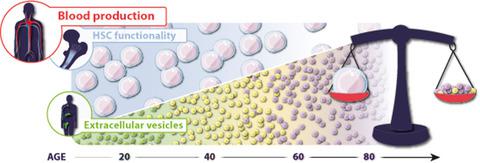当前位置:
X-MOL 学术
›
Aging Cell
›
论文详情
Our official English website, www.x-mol.net, welcomes your
feedback! (Note: you will need to create a separate account there.)
Blood extracellular vesicles from healthy individuals regulate hematopoietic stem cells as humans age
Aging Cell ( IF 8.0 ) Pub Date : 2020-10-07 , DOI: 10.1111/acel.13245 Isabelle Grenier-Pleau 1 , Kathrin Tyryshkin 2 , Tri Dung Le 1 , John Rudan 3 , Eric Bonneil 4 , Pierre Thibault 4 , Karen Zeng 1 , Cecilia Lässer 5 , David Mallinson 6 , Dimitrios Lamprou 7 , Jialui Hui 8 , Lynne-Marie Postovit 1, 8 , Edmond Y W Chan 1 , Sheela A Abraham 1
Aging Cell ( IF 8.0 ) Pub Date : 2020-10-07 , DOI: 10.1111/acel.13245 Isabelle Grenier-Pleau 1 , Kathrin Tyryshkin 2 , Tri Dung Le 1 , John Rudan 3 , Eric Bonneil 4 , Pierre Thibault 4 , Karen Zeng 1 , Cecilia Lässer 5 , David Mallinson 6 , Dimitrios Lamprou 7 , Jialui Hui 8 , Lynne-Marie Postovit 1, 8 , Edmond Y W Chan 1 , Sheela A Abraham 1
Affiliation

|
Hematopoietic stem cells (HSCs) maintain balanced blood cell production in a process called hematopoiesis. As humans age, their HSCs acquire mutations that allow some HSCs to disproportionately contribute to normal blood production. This process, known as age‐related clonal hematopoiesis, predisposes certain individuals to cancer, cardiovascular and pulmonary pathologies. There is a growing body of evidence suggesting that factors outside cells, such as extracellular vesicles (EVs), contribute to the disruption of stem cell homeostasis during aging. We have characterized blood EVs from humans and determined that they are remarkably consistent with respect to size, concentration, and total protein content, across healthy subjects aged 20–85 years. When analyzing EV protein composition from mass spectroscopy data, our machine‐learning‐based algorithms are able to distinguish EV proteins based on age and suggest that different cell types dominantly produce EVs released into the blood, which change over time. Importantly, our data show blood EVs from middle and older age groups (>40 years) significantly stimulate HSCs in contrast to untreated and EVs sourced from young subjects. Our study establishes for the first time that although EV particle size, concentration, and total protein content remain relatively consistent over an adult lifespan in humans, EV content evolves during aging and potentially influences HSC regulation.
中文翻译:

随着人类年龄的增长,来自健康个体的血液细胞外囊泡调节造血干细胞
造血干细胞 (HSC) 在称为造血作用的过程中维持平衡的血细胞生成。随着人类年龄的增长,他们的 HSC 会发生突变,从而使某些 HSC 对正常的血液生成做出不成比例的贡献。这一过程被称为与年龄相关的克隆性造血,使某些个体易患癌症、心血管和肺部疾病。越来越多的证据表明,细胞外的因素,如细胞外囊泡 (EV),会在衰老过程中破坏干细胞稳态。我们已经表征了来自人类的血液 EV,并确定它们在 20-85 岁的健康受试者中在大小、浓度和总蛋白质含量方面非常一致。从质谱数据分析 EV 蛋白质组成时,我们基于机器学习的算法能够根据年龄区分 EV 蛋白,并表明不同的细胞类型主要产生释放到血液中的 EV,并且随着时间的推移而变化。重要的是,我们的数据显示,与未经治疗和来自年轻受试者的 EVs 相比,来自中老年组(> 40 岁)的血液 EVs 显着刺激 HSC。我们的研究首次确定,尽管 EV 颗粒大小、浓度和总蛋白质含量在人类成年期保持相对一致,但 EV 含量在衰老过程中会发生变化,并可能影响 HSC 调节。我们的数据显示,与未经治疗和来自年轻受试者的 EVs 相比,来自中老年组(> 40 岁)的血液 EVs 显着刺激 HSC。我们的研究首次确定,尽管 EV 颗粒大小、浓度和总蛋白质含量在人类成年期保持相对一致,但 EV 含量在衰老过程中会发生变化,并可能影响 HSC 调节。我们的数据显示,与未经治疗和来自年轻受试者的 EVs 相比,来自中老年组(> 40 岁)的血液 EVs 显着刺激 HSC。我们的研究首次确定,尽管 EV 颗粒大小、浓度和总蛋白质含量在人类成年期保持相对一致,但 EV 含量在衰老过程中会发生变化,并可能影响 HSC 调节。
更新日期:2020-11-23
中文翻译:

随着人类年龄的增长,来自健康个体的血液细胞外囊泡调节造血干细胞
造血干细胞 (HSC) 在称为造血作用的过程中维持平衡的血细胞生成。随着人类年龄的增长,他们的 HSC 会发生突变,从而使某些 HSC 对正常的血液生成做出不成比例的贡献。这一过程被称为与年龄相关的克隆性造血,使某些个体易患癌症、心血管和肺部疾病。越来越多的证据表明,细胞外的因素,如细胞外囊泡 (EV),会在衰老过程中破坏干细胞稳态。我们已经表征了来自人类的血液 EV,并确定它们在 20-85 岁的健康受试者中在大小、浓度和总蛋白质含量方面非常一致。从质谱数据分析 EV 蛋白质组成时,我们基于机器学习的算法能够根据年龄区分 EV 蛋白,并表明不同的细胞类型主要产生释放到血液中的 EV,并且随着时间的推移而变化。重要的是,我们的数据显示,与未经治疗和来自年轻受试者的 EVs 相比,来自中老年组(> 40 岁)的血液 EVs 显着刺激 HSC。我们的研究首次确定,尽管 EV 颗粒大小、浓度和总蛋白质含量在人类成年期保持相对一致,但 EV 含量在衰老过程中会发生变化,并可能影响 HSC 调节。我们的数据显示,与未经治疗和来自年轻受试者的 EVs 相比,来自中老年组(> 40 岁)的血液 EVs 显着刺激 HSC。我们的研究首次确定,尽管 EV 颗粒大小、浓度和总蛋白质含量在人类成年期保持相对一致,但 EV 含量在衰老过程中会发生变化,并可能影响 HSC 调节。我们的数据显示,与未经治疗和来自年轻受试者的 EVs 相比,来自中老年组(> 40 岁)的血液 EVs 显着刺激 HSC。我们的研究首次确定,尽管 EV 颗粒大小、浓度和总蛋白质含量在人类成年期保持相对一致,但 EV 含量在衰老过程中会发生变化,并可能影响 HSC 调节。











































 京公网安备 11010802027423号
京公网安备 11010802027423号